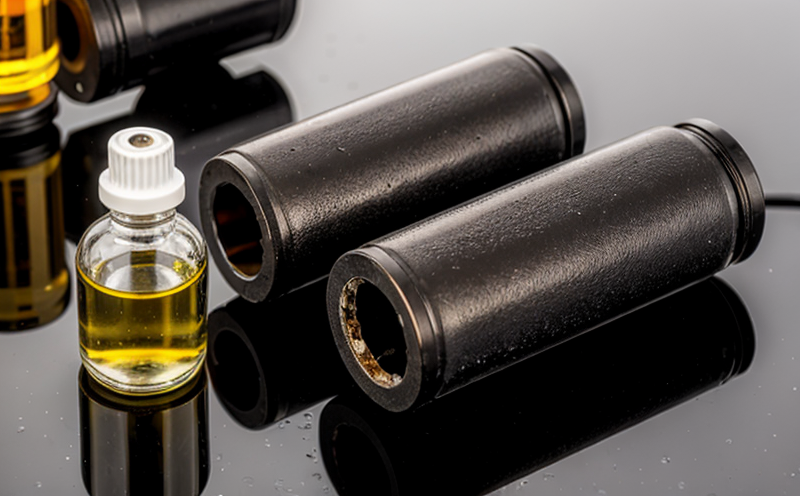ISO 9377 1 Dissolved Hydrocarbons Test in Water Validation Method Development Test
The ISO 9377-1 standard provides a validated method for the determination of dissolved hydrocarbons in water. This test is crucial for ensuring that wastewater treatment facilities are meeting environmental regulations and quality standards set by governing bodies such as the Environmental Protection Agency (EPA) or similar international organizations.
Our laboratory specializes in developing, validating, and implementing this method to ensure accuracy, precision, and reliability of the results. This service is particularly important for industries that discharge hydrocarbons into water systems, including oil refineries, chemical plants, and manufacturing facilities. By adhering to ISO 9377-1 standards, these companies can demonstrate compliance with environmental laws and regulations.
The test involves several critical steps: initial sample collection, preparation of the sample for analysis, and finally, the actual testing using sophisticated instrumentation. Sample collection is typically performed at various points in a wastewater treatment process to ensure that all relevant hydrocarbons are captured. Once collected, samples undergo rigorous pretreatment procedures before being analyzed.
The ISO 9377-1 method uses gas chromatography with flame ionization detection (GC-FID) as the primary analytical technique due to its high sensitivity and selectivity for hydrocarbon compounds. This approach ensures that even trace amounts of dissolved hydrocarbons can be detected, which is essential for accurate monitoring.
Developing a validated method requires thorough validation studies that include method linearity, precision, accuracy, and robustness checks. These tests are conducted to ensure the method produces consistent results under different conditions and sample types. Our team works closely with clients to tailor these validations to meet specific project needs and regulatory requirements.
Our laboratory’s expertise in this area extends beyond just validation; we also offer full lifecycle support for ISO 9377-1 testing, from method development through implementation and ongoing quality assurance. This comprehensive approach ensures that our clients have a robust solution for monitoring their wastewater discharge.
- Method Development: We start by reviewing existing literature and industry best practices to ensure the method is up-to-date with current standards.
- Validation Studies: Extensive validation studies are conducted to meet ISO 9377-1 requirements, ensuring precision, accuracy, and robustness.
- Implementation Support: Our team provides guidance on implementing the validated method in your facility’s testing protocols.
- Ongoing Quality Assurance: We offer continuous support to ensure that all tests meet ISO 9377-1 standards and are conducted consistently over time.
Applied Standards
The ISO 9377-1 standard is widely recognized for its comprehensive approach to measuring dissolved hydrocarbons in water. This method aligns with other international standards such as ASTM D6458 and EN 12050, which are also used extensively by industries dealing with oil and wastewater.
The primary objective of ISO 9377-1 is to provide a reliable means for quantifying dissolved hydrocarbons in water samples. This standard specifies the use of gas chromatography techniques, particularly GC-FID, as the preferred analytical method due to its ability to detect even minute concentrations of hydrocarbons.
Our laboratory strictly adheres to these standards during all phases of testing, ensuring that our results are comparable and acceptable worldwide. This commitment to international standards ensures that our clients can confidently rely on our test results for regulatory compliance and internal quality control purposes.
Customer Impact and Satisfaction
Our ISO 9377-1 Dissolved Hydrocarbons Test in Water Validation Method Development service has significantly impacted several key areas of our clients' operations. By providing accurate, reliable testing results, we help ensure that our clients are compliant with stringent environmental regulations.
One of the most notable impacts is on quality management within facilities that handle hydrocarbon waste. Our tests provide critical data for decision-making processes related to wastewater treatment and discharge. This information helps companies optimize their operations, reduce environmental impact, and avoid costly penalties associated with non-compliance.
For compliance officers, our services offer peace of mind knowing that all testing is conducted according to the highest international standards. This ensures that clients meet regulatory requirements without having to invest in extensive internal testing capabilities.
R&D engineers benefit from our expertise in method development and validation, which can lead to new insights into wastewater treatment processes and hydrocarbon dispersion models. This knowledge can accelerate innovation and improve operational efficiency within the facility.
Our services also contribute positively to procurement practices by providing reliable data on potential suppliers' compliance with environmental standards. This helps companies select partners who share their commitment to sustainability and regulatory adherence.
International Acceptance and Recognition
- Australia: ISO 9377-1 is widely recognized by the National Environment Protection Council (NEPC) for its role in water quality management.
- Canada: The Canadian Environmental Assessment Agency (CEAA) and provincial environmental agencies accept results from tests conducted according to this standard.
- United States: The EPA recognizes ISO 9377-1 as a valid method for assessing dissolved hydrocarbons in water samples.
- European Union: ISO standards are harmonized with EU directives, making ISO 9377-1 an accepted testing protocol across member states.





